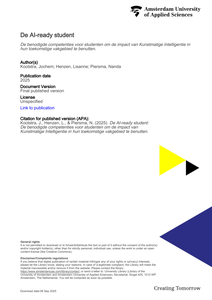De coronacrisis was niet voorzien, ondanks alle grote beloftes die worden gedaan over de mogelijkheden van big data. Nog een tekortkoming van grootschalige dataverzameling en analyse is dat we oplossingen van maatschappelijke problemen te eenzijdig technocratisch willen oplossen. Het blijkt in deze tijd juist dat leiderschap van belang is. Dat vraagt leiders die verantwoordelijkheid durven nemen, volgers die het grotere belang daarvan zien én kritisch blijven.
LINK
Big data heeft niet alleen geleid tot uitdagende technische vraagstukken, ook gaat het gepaard met allerlei nieuwe ethische en morele kwesties. Om verantwoord met big data om te gaan, moet ook over deze kwesties worden nagedacht. Want slecht datagebruik kan nadelige gevolgen hebben voor grote groepen mensen en voor organisaties. In de slotaflevering van deze serie verkennen Klaas Jan Mollema en Niek van Antwerpen op een pragmatische manier de ethische kant van big data, zonder te blijven steken in de negatieve effecten ervan.
DOCUMENT

Datagebruik en omgang met persoonsgegevens gaan in bijna elke toekomstige baan op hbo-niveau een rol spelen. Dat betekent dat alle instituten van de Hogeschool Utrecht moeten nadenken over hoe zij hun toekomstige professionals hierop gaan voorbereiden. De vraag is of dat op dit moment adequaat en efficiënt gebeurt.
DOCUMENT

Seamless design is an important dogma of dataism. Without unpredictable behaviour, however, there’s no data to retrieve. A wholly predictable future is just a continuous present, a tyranny of choices on offer.
MULTIFILE

De ontwikkeling en toepassing van Kunstmatige Intelligentie (KI) heeft een aanzienlijke impact op bestaande competenties binnen vrijwel elk vakgebied, van onderzoek tot communicatie. Voor niet-ICT-opleidingen betekent dit dat het onderwijs moet worden aangepast om studenten effectief voor te bereiden op een AI-gedreven toekomst. Hoewel 21e-eeuwse vaardigheden een solide basis bieden voor een snel veranderende wereld vol technologie, digitalisering en innovatie, rijst de vraag of deze vaardigheden voldoende zijn in een tijd waarin dagelijks honderden nieuwe AI-tools verschijnen. Het onderzoeksproject `AI4Students' biedt een innovatieve aanpak waarin hbo-teams van docenten en studenten samenwerken aan de ontwikkeling van `AI-ready persona's'. Deze persona's definiëren AI-gerelateerde competenties die niet alleen de toekomst van hun eigen opleiding vormgeven, maar ook een waardevolle leidraad bieden voor andere opleidingen om hun specifieke werkveld beter te begrijpen en te integreren.
DOCUMENT

Humans use metaphors in thinking. Most metaphors are visual. In processing information stimuli the mind depends partly on visual codes. Information is processed and stored through two channels: one for non-verbal information and another for verbal information. The two different areas of information in the brain are interconnected. The information is stored in patterns that form an inner representation of how individuals perceive their reality and their self. The active processing of new information, remembering and the self-image are related phenomena, that influence each other, sometimes leading to biased interpretation or even reconstruction of contents in each of these areas. Imagination, expectations and anticipations of the future and memories are the more active manifestations of this process. In this process mimesis plays an important role. Mimesis is the imitation of reality in play, story-telling or creating images of how things should look like in the future. Through mimesis people can anticipate on roles in social life, or appropriate experiences from someone else and relate them to one’s own life story. When this happens the information is related to the self through processes of association and becomes ‘Erfahrung’.
DOCUMENT

To identify ethical issues that interns encounter in their clinical education and thus build a more empirical basis for the required contents of the clinical ethics curriculum. The authors analyzed a total of 522 required case reports on ethical dilemmas experienced by interns from September 1995 to May 1999 at the medical school of Vrije Universiteit in Amsterdam. They identified four regularly described and numerous less frequently described topics. The interns addressed a wide range of ethical themes. In 45% of the cases, they mentioned disclosure or non-disclosure of information and informed consent; in 37%, medical decisions at the end of life; in 16%, medical failures; and in 9%, problems transferring patients from one caregiver to another. The interns also identified 27 themes linked to their unique position as interns and 19 themes related to specific types of patients. Based on self-reported experiences, the authors conclude that clinical ethics teachers should reflect on a multitude of dilemmas. Special expertise is required with respect to end-of-life decisions, truth telling, medical failures, and transferring patients from one caregiver to another. The clinical ethics curriculum should encourage students to voice their opinions and deal with values, responsibilities, and the uncertainty and failings of medical interventions.
DOCUMENT

This thesis is about dilemmas, discretionary space and ethics in public welfare. In my position as a lecturer of ethics in socio-legal practices I am concerned with the way in which these practices open up to an ethical development of their professionals. Thus, this thesis is a search for the most fundamental themes and issues in understanding and judging public welfare as a, perhaps, ethical socio-legal practice. In the field of public services professionals function as the intermediary between government and citizen. In their daily work public welfare professionals take care of the important societal task and goal of poverty alleviation. During the last decades, public welfare has developed into a civil right that involves many obligations on the part of the client in return. The requirement to see to it that the client fulfils these obligations has complicated the public welfare professional’s task of helping citizens in need.
DOCUMENT

Sinds 15 jaar vindt er binnen het HBO in Nederland onderzoek plaats. Er is tot op heden weinig aandacht voor de ethische risico's en de specifieke context van dit soort praktijkgericht sociaalwetenschappelijk onderzoek.
DOCUMENT
